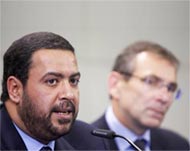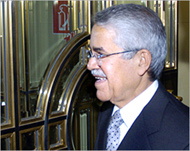Opec pressured to raise output quota
Opec nations look poised to increase a production ceiling even though such a move is unlikely to drive down prices, oil ministers have said.

The sudden surge of oil prices amid fresh supply fears added pressure on Opec members ahead of their annual meeting in Vienna on Wednesday.
The price of light sweet crude for delivery in July jumped $2.08 to $55.62 a barrel in New York on Monday while in London, Brent North Sea crude oil for delivery in July climbed $2.11 to close at $54.78 a barrel.
The move for a 500,000-barrel-per-day (bpd) increase in Opec’s collective production quota was being led by Saudi Arabia, although the cartel’s members are already pumping out oil above their agreed limit.
Saudi Oil Minister Ali Al-Nuaimi had argued for the increase to 28 million bpd during a visit to Norway last week. “If you follow my comments in Norway, that should answer all your questions,” he said in Vienna on Monday.
Support for hike
Other Opec oil and energy chiefs arriving in the Austrian capital, including the cartel’s president, Kuwait‘s Ahmad Fahd al-Sabah and counterparts from Algeria, Libya and Nigeria, signalled they were ready to support the move.
 |
|
Al-Sabah (L) says an output hike |
“We are already producing that actually, now we are over 28 [million bpd] … but at least this will give a good signal to the market,” al-Sabah said.
Libya‘s energy chief Fathi Ben Shatwan said: “I think we have to discuss that. We don’t have a problem with it,” while insisting that it would be a purely “psychological” gesture.
Oil ministers were voicing considerable doubts about the value of the move in the current market, beyond soothing the feelings of industrialised nations that have long complained about the impact of high prices on global growth.
Iran‘s Oil Minister Bijan Namdar Zanghaneh cautioned in Tehran that oil-producing countries were virtually powerless.
“I believe there is no important spare capacity left in the world to produce more oil. Any official increase or decrease will only satisfy the market psychologically and have no real impact,” he said.
Iran’s position
“Yes, we are worried and we cannot do anything about it. We prefer the prices to be less than $50 a barrel and to be between $40 and 5$0,” said the Iranian minister, who is due in Vienna on Tuesday.
“A price of more than $55 would be a very high price and have a bad effect on the world economy, but I don’t think Opec can do anything,” he added.
Iran is the second largest producer in the Organisation of the Petroleum Exporting Countries (Opec).
Saudi Arabia is seen as the only member state that can still increase its output significantly.
Asked if the Saudis could push their output from 9.5 million bpd to 10 million bpd in the third and fourth quarter, al-Nuaimi replied: “I have no idea. We can, if we will. That will depend on demand.”
The 11-member cartel is pumping out oil at its highest level since October 2004 at about 30 million bpd, nearing record highs achieved in 1980.
Global forecast
Overall world oil output, including Opec, Russia, the United States, Britain, Norway and other producers reached 84.6 million bpd in May, the Paris-based International Energy Agency said in data released last Thursday.
 |
|
Al-Nuaimi pledged his country |
It also forecast in its annual report that average global demand in 2005 would reach 84.3 million bpd, just below the current output.
Ministers insisted that high oil prices were largely down to a global shortage of adequate refinery facilities, not crude extraction.
“I think we have to work together, producers and consumers, to do something with the refining because this is our main problem now,” al-Sabah said.
Analysts are bracing for a traditional increase in global oil demand with the onset of cold weather in the western hemisphere in the last quarter, with an added increase in consumption in fast-growing China.
“The fourth quarter is going to be tense. We expect probably prices to stay where they are,” Algeria‘s Energy Minister Chakib Khelil said as he arrived in Vienna.